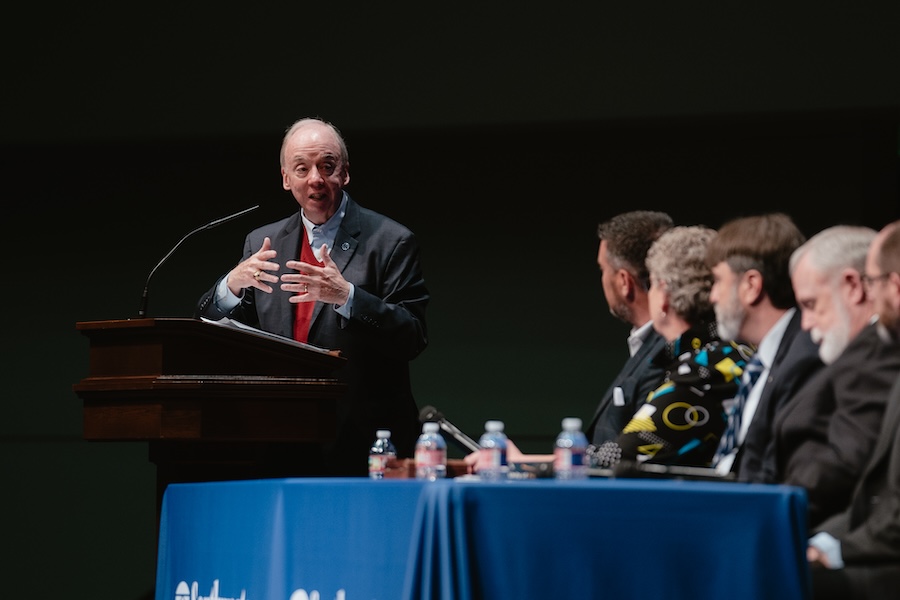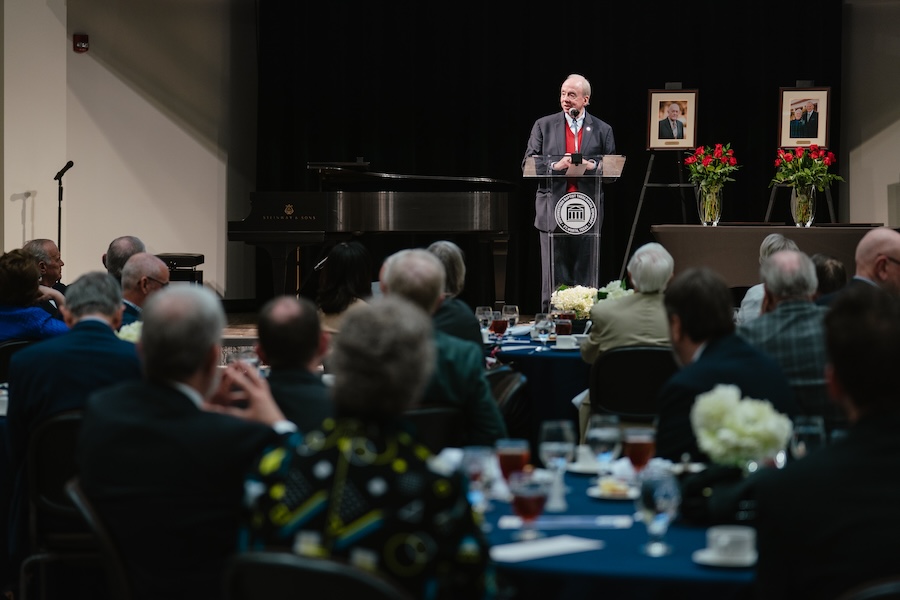Ron Man states all nations ultimately will exalt God’s name

God’s name will be great among the nations preached Ron Man, director of Worship Resources International, during his Sept. 12 chapel message at Southwestern Baptist Theological Seminary and Texas Baptist College.
Man was part of the Global Consultation on Arts and Music in Missions (GCAMM) conference, which was being held on the campus.
Man preached from Malachi 1:11 along with providing context and examples from both the Old and New Testaments on exalting God’s name.
“God’s intention, plan, and purpose for His name is to be seen as great among the nations,” Man stated, referring to Malachi 1:11. “For the peoples of the earth to bow down, worship and acknowledge Him as Creator and Redeemer.”
Man claimed mankind had another idea.
“After sin infected the human race through the fall, we see mankind running the other way,” he said.
Man referenced the inhabitants of Babel in Genesis 11, “who instead of filling the earth according to God’s command, instead congregated together and sought to build a great monument to themselves as they prideful declared, as we see in Genesis 11:4, ‘let us make a name for ourselves.’”
He said that in their pride they wanted to exalt their own names and not God. In turn, Man said, God confused their language. He dispersed them over all the earth.
“This judgment of God results in the formation of nations, cultures, and the many different languages of the earth,” he said.
Yet while God has forced the formation of nations and languages, Man expressed that God has a plan for those nations as seen in the call of Abraham in Genesis 12.
“While God is focusing in on one man, one family and plans to grow one special people, one called nation from Abraham’s descendants,” Man explained, “at the same time, God’s intention and plan in the long-term is always for the worldwide blessing of all peoples, often therefore called the ‘Great Commission’ of the Old Testament.”
Man said despite the Old Testament largely being Israel’s story, there are glimmers in multiple books of the larger purposes of God for the nations, namely to show His name to be great. Man referred to Joshua 2 when in Jericho, Rahab, a Gentile, hid the Israeli spies.
“Forty years after the events of the Exodus, what God had done in Egypt was still resonating among the surrounding peoples,” Man stated. “It had gripped Rahab’s heart, as well.”
Man called attention to Joshua 2:11 and Rahab’s words.
“That is a profession of faith from the lips of Rahab, and we read how Rahab and her family are sparred in the destruction of Jericho,” he explained. “Later, in Hebrews 11, the writer includes Rahab among one of the great heroes of the faith.”
Man pointed attention to Matthew 1 and the genealogy stated in that chapter how Rahab married and became the mother of Boaz, who married Ruth, the great-grandmother of King David, and amazingly finds her way into the family tree of the Lord Jesus.
“Such is the grace of God that this Gentile prostitute can find her way into the ancestral line of the Savior,” he said. “There is no hopeless cause.”
Man proclaimed that God chose and blessed His people so that they would be a light to the other nations.
“To the honor of God’s name and the praise of His glory,” Man stated.
As Man shifted to the New Testament, he said, “Jesus not only reached out comfortably to the rejects and the untouchables to Jewish society, but He honored faith in Him wherever He found it.”
Man gave examples such as the Roman centurion, the Syrophoenician woman, the Samaritan woman at the well, and the Great Commission.
“And as a reminder,” Man explained, “Jesus told the disciples right before He ascended in Acts 1:8 that the Holy Spirit would enable them to go beyond the borders of Israel even to the uttermost parts of the earth with a Gospel message.”
Man turned the congregation’s attention to Acts 2 on the Day of Pentecost, the beginning of the end of the language curse.
“But in Acts, there’s still some inertia and resistance against going beyond the borders of the Jewish nation and accepting Gentiles as full partners of the Christian church,” Man stated. “Until at the Jerusalem Council in Acts 15, we have that epochal decision that flung the door wide open to all peoples to come on the bases of faith in Christ alone.”
In the scenes of worship in Revelation, Man said readers can see the “beautiful cultural and national diversity,” a multitude that no one could number, gathered around the throne of God in Heaven.
“That number is identified as made of those from every nation, from all tribes, peoples, and languages,” Man stated.
In closing, Man called the attention of two items about this scene.
“First that innumerable throne cries out salvation belongs to our God who sits on the throne and to the Lamb,” he said. “They don’t cry, ‘we’re saved.’ But rather, ‘Salvation belongs to our God.’ They’re utterly God-centered, God-focused, declaring, ‘He did this. He planned for our salvation.’”
Man said the ultimate example of God sovereignly causing sin to be turned to good is the crucifixion of the Son of God at the hands of sinful men, which results in eternal salvation.
“Secondly … God, in His sovereignty, takes the worst humanity can throw at Him and turns it into His praise,” Man explained. “He receives more praise, multiplied praise, because of that diversity that came out of man’s rebellion originally. The nations will come in with their beautiful diversity to heap multilingual, multicultural praises to the God of their salvation. God’s name will be great among all nations.”
Man holds a Bachelor of Music in theory and composition and a Master of Music in conducting from the University of Maryland. He earned a Master of Theology, and later a Doctor of Ministry degree, from Dallas Theological Seminary
Man’s entire message can be viewed here.
Chapel is held every Tuesday and Thursday morning at 10 a.m. (CT) in MacGorman Chapel on the campus of Southwestern Seminary and TBC. Chapel may be viewed live at swbts.live.



